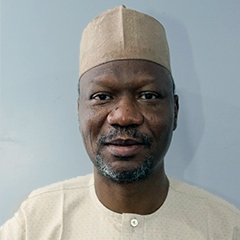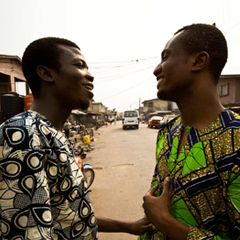Kole Shettima and Erin Sines, Co-Directors of On Nigeria, discuss the wind down of the On Nigeria strategy and their hopes for the anti-corruption legacy as the Nigerian-led transparency and accountability movement continues to grow.
As a time-limited initiative, we have always had the eventual end of this strategy in mind and have spent considerable time reflecting with our grantees and our evaluation and learning partner on what we want our shared legacy to be. In our efforts to reduce corruption in Nigeria, we work to find the right balance between aspiration and pragmatism. While we have close to 150 grantee and sub-grantee organizations from across Nigeria and beyond, we know that we are but one (albeit large) actor in a complex ecosystem of communities, civil society, political and governmental actors, the private sector, and donors.
Some of what we aspired to achieve has already happened. Our grantee community affirms that they value working collaboratively in demand-driven partnerships, and we have examples of how multi-sector collaboration has changed the perspectives and behaviors of some young people, faith leaders, and government actors regarding corruption and enhanced implementation of the Administration of Criminal Justice Act (ACJA) and state-level laws. We are also seeing examples of citizens understanding their rights and using newly acquired skills to monitor and hold officials accountable, along with greater interest and capacity for investigative journalism by local journalists. Unsurprisingly, we also have areas where we have room to grow, in particular when it comes to engaging people from disadvantaged backgrounds in news reporting and coverage, project design and execution, and policy advocacy and implementation.
While we are excited to see how On Nigeria’s ecosystem of anti-corruption continues to grow in Nigeria, we are also concerned about the future of civil society when it comes to transparency, accountability, participation, and anti-corruption fields, and Nigerian and West African civil society at large. Around the world, civic space is diminishing, democracy is backsliding, and authoritarianism is increasing, according to CIVICUS and Action for Empowerment and Accountability. The global funding landscape for transparency, accountability, governance, and anti-corruption efforts is shifting, with foundations taking on an increasing share of support for governance. Furthermore, a recent TAI analysis of public integrity funds shows that anti-corruption funding has been decreasing over the last five years.
Though the On Nigeria strategy will come to a close at the end of 2024, the MacArthur Foundation has no plans to leave Nigeria. Regardless of the priorities we select in the future, our departure from our current initiative will not be easy on our partners. Our team is working hard to wind down as transparently and responsibly as possible. We have made funding available for organizational strengthening and skill building opportunities. All grantee partners have received final grants and years of notice about our winding down of the strategy. We have a small, expedited grant fund that we can use to enable organizations to participate in travel, meetings, and research to advance their work. Yet, we recognize that it will not be enough. Since the inception of the On Nigeria Big Bet in 2015, we have granted nearly $152 million to people and organizations working to address corruption. Despite our best planning, we realize that our absence will be felt. While the On Nigeria community has achieved many gains, some are fragile. Which ones will endure, and how will they evolve?
Looking ahead, our hope is that the On Nigeria movement continues to grow, deepen, and coalesce around topics that are important to Nigerians, whether it is climate change, youth employment, security, education, or political participation. While not every project that was piloted will last, we hope that key elements of the work we supported continue to find their way into changing systems. We hope that civil society continues to work collaboratively and find strength in the collective, that they keep centering justice and gender equity and social inclusion in their work, and that they keep learning, iterating, and communicating their success and stories. We hope that the appetite for investigative news continues to grow, that quality of reporting continues to improve, and that civil society and the media collaborate to demand government accountability. We hope that the criminal justice sector continues to harmonize around the ACJA, making access to justice faster and more reliable for all Nigerians. We hope that by prioritizing skill building at the request of grantees—with funding for learning and evaluation, communications support, behavior change resources, and gender equity and social inclusion trainings—grantees are stronger than they were before they joined On Nigeria.
Finally, for those outside of Nigeria, we hope that our work to support Nigerian-led efforts offers lessons to inform the growing movement to center local leadership in social and economic development, and that the global field of transparency and accountability will continue to flourish under Nigerian leadership.





